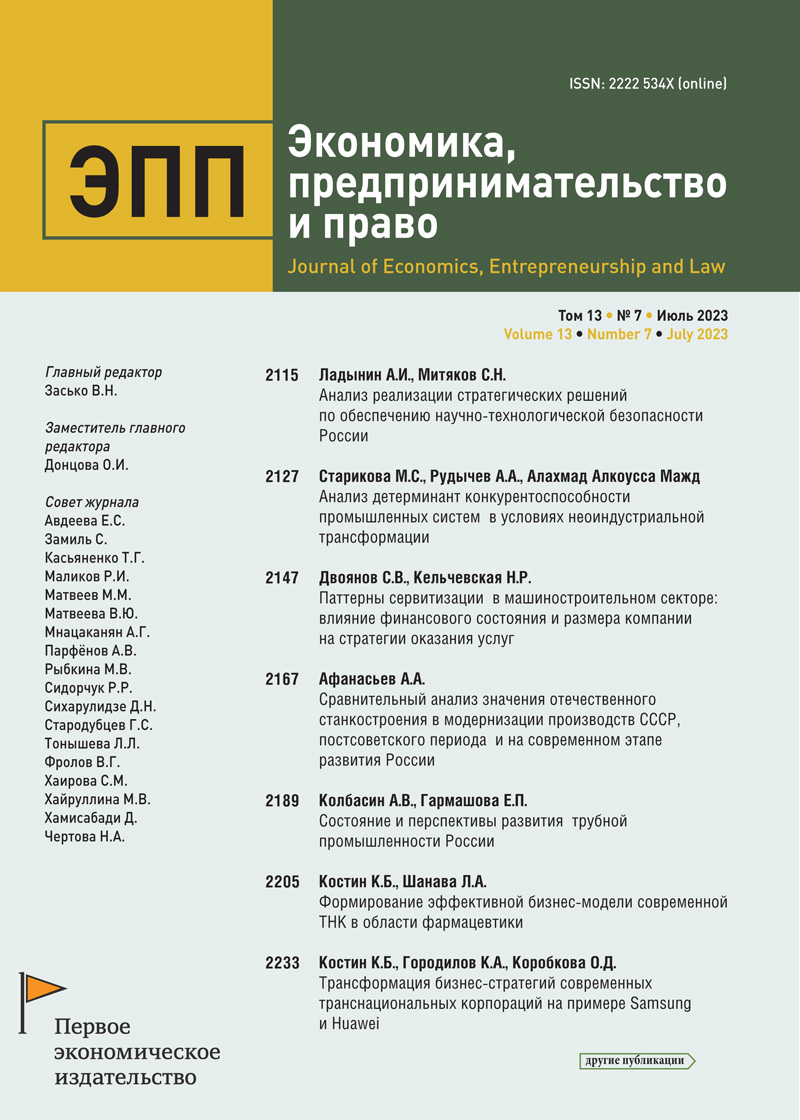Impact of urbanization on territorial development
- Autores: Grachev S.A.1
-
Afiliações:
- Vladimir State University named after Alexander and Nikolay Stoletovs
- Edição: Volume 13, Nº 7 (2023)
- Páginas: 2427-2444
- Seção: Articles
- URL: https://journals.eco-vector.com/2222-534X/article/view/607719
- DOI: https://doi.org/10.18334/epp.13.7.118232
- ID: 607719
Citar
Texto integral
Resumo
The article deals with the problems of the relationship between individual parameters of urbanization and indicators of territorial development.The relevance of this research is associated with the increased influence of the urbanization process on all aspects of the social and economic functioning of territories.The authors' approach to assess the relationship between the parameters of urbanization has been formed. The concept of sustainable development (in terms of the environmental component) was defined.The processes of the human capital formation in the particular territory with the subsequent modeling were identified. It becomes possible to attribute the received tools to the elements of scientific novelty, as well as the identification of individual characteristics depending on the level of management (strengthening or weakening of interdependencies with a change in the nature of communication).The authors' approach makes it possible to solve individual tasks of planning the social and economic development of the national system, as well as the subjects of the Federation, with the inclusion of individual territorial features in the future.Models of national, district and regional levels are obtained. It was proved that there is a relationship between individual parameters of urbanization, greening and indicators of human capital. The territorial features of these processes are determined.This research can be used in the future by researchers and representatives of public administration for planning and analyzing social and economic regional and national processes.
Palavras-chave
Sobre autores
Sergey Grachev
Vladimir State University named after Alexander and Nikolay Stoletovs
Email: grachev-sa@yandex.ru
Bibliografia
- Наше общее будущее: Доклад Всемирной комиссии по вопросам окружающей среды и развития. Оон. [Электронный ресурс]. URL: http://www.un.org/ru/ga/pdf/brundtland.pdf (дата обращения: 15.05.2023).
- Tilly Ch. The forms of urbanization. / American Sociology: Perspectives, Problems, Methods. - N.Y.; L.: Basic Books, Inc., 1968. – 390 p.
- Nathaniel O. Anyanwu M. Shah Renewable energy, urbanization, and ecological footprint in the Middle East and North Africa region // Environmental Science and Pollution Research. – 2020. – № 13. – p. 14601-14613. – doi: 10.1007/s11356-020-08017-7.
- Фаузер В.В., Смирнов А.В. Международные и российские подходы к изучению устойчивого развития городского пространства: от теории к практике // Экономические и социальные перемены: факты, тенденции, прогноз. – 2023. – № 1. – c. 85-102. – doi: 10.15838/esc.2023.1.85.5.
- Мухаметов Д.Р. Создание устойчивых умных городов: технологии вовлечения граждан и совместного экспериментирования // Вопросы инновационной экономики. – 2022. – № 2. – c. 843-858. – doi: 10.18334/vinec.12.2.114443.
- Majeed A., Khan M.A., Jiang P., Olah J., Ahmad M. The impact of foreign direct investment on financial development: New evidence from panel cointegration and causality analysis // Journal of Competitiveness. – 2021. – № 1. – p. 95-112. – doi: 10.7441/joc.2021.01.06.
- Danish M.A. Baloch Dynamic linkages between road transport energy consumption, economic growth, and environmental quality: evidence from Pakistan // Environmental Science and Pollution Research. – 2018. – № 8. – p. 7541-7552. – doi: 10.1007/s11356-017-1072-1.
- Akbostanci E., Türüt-Aşik S., Tunç G.I. The relationship between income and environment in Turkey: Is there an environmental Kuznets curve? // Energy Policy. – 2009. – № 3. – p. 861-867. – doi: 10.1016/j.enpol.2008.09.088.
- Rees W., Wackernagel M. Urban ecological footprints: Why cities cannot be sustainable “and why they are a key to sustainability // Environmental Impact Assessment Review. – 1996. – № 4-6. – p. 223-248. – doi: 10.1016/S0195-9255(96)00022-4.
- Ветрова М.А., Варламова М.П. Осуществление ESG-стратегий в условиях санкций: опыт Ирана и рекомендации для России // Креативная экономика. – 2023. – № 1. – c. 91-110. – doi: 10.18334/ce.17.1.116801.
- Ускова Т.В. Методическое обеспечение задачи адаптации региональной экономики к новым условиям хозяйствования // Проблемы развития территории. – 2023. – № 2. – c. 7-9. – doi: 10.15838/ptd.2023.2.124.1.
- Amer E.A.A.A., Meyad E.M.A., Gao Y., Xu H., Zhang D. Exploring the link between natural resources, urbanization, human capital, and ecological footprint: A case of GCC countries // Ecological Indicators. – 2022. – p. 109556. – doi: 10.1016/j.ecolind.2022.109556.
- Kokkinos K., Karayannis V., Moustakas K. Circular bio-economy via energy transition supported by Fuzzy Cognitive Map modeling towards sustainable low-carbon environment // Science of The Total Environment. – 2020. – p. 137754. – doi: 10.1016/j.scitotenv.2020.137754.
- Почепаев И.А., Макаров И.Н., Хрючкина Е.А. Связь человеческого капитала и территориального развития в контексте обеспечения экономической безопасности регионов // Креативная экономика. – 2022. – № 12. – c. 4675-4690. – doi: 10.18334/ce.16.12.116295.
- Савченко Ю.Ю. Интеллектуальный капитал и Индустрия 4.0: взаимодействие и факторы влияния // Креативная экономика. – 2023. – № 3. – c. 935-954. – doi: 10.18334/ce.17.3.117363.
- Zafar M.W., Zaidi S.A.H., Khan N.R., Mirza F.M., Hou F., Kirmani S.A.A. The impact of natural resources, human capital, and foreign direct investment on the ecological footprint: The case of the United States // Resources Policy. – 2019. – p. 101428. – doi: 10.1016/j.resourpol.2019.101428.
- Hassan S.T., Xia E., Khan N.H., Shah S.M.A. Economic growth, natural resources, and ecological footprints: evidence from Pakistan // Environmental Science and Pollution Research. – 2019. – № 3. – p. 2929-2938. – doi: 10.1007/s11356-018-3803-3.
- Ahmed Z., Wang Z. Investigating the impact of human capital on the ecological footprint in India: An empirical analysis // Environmental Science and Pollution Research. – 2019. – № 26. – p. 26782-26796. – doi: 10.1007/s11356-019-05911-7.
- Langnel Z., Amegavi G.B., Donkor P., Mensah J.K. Income inequality, human capital, natural resource abundance, and ecological footprint in ECOWAS member countries // Resources Policy. – 2021. – p. 102255. – doi: 10.1016/j.resourpol.2021.102255.
- Андрющенко Г.И., Савина М.В., Хоминич И.П. Анализ факторов, определяющих качество человеческого капитала в условиях цифровизации экономики // Креативная экономика. – 2023. – № 3. – c. 955-970. – doi: 10.18334/ce.17.3.117409.
Arquivos suplementares









